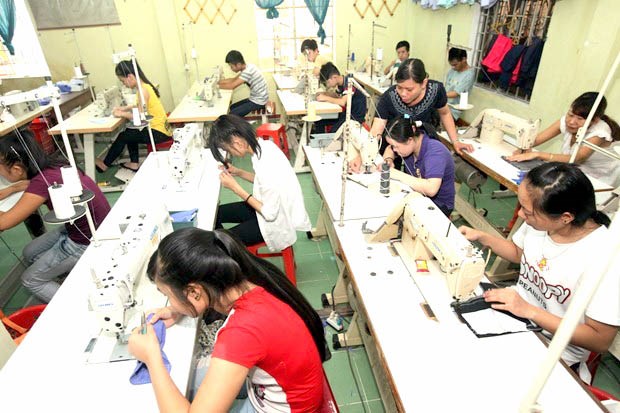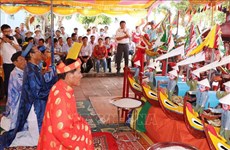Social assistance helps disabled people integrate into community
Looking at the disabled people working hard on the sewing machines, Nguyen Kim Khoi feels happy and wants to be able to help more people.
 Illustrative image (Photo: VNA)
Illustrative image (Photo: VNA) Hanoi (VNS/VNA) - Looking at the disabled people working hard on the sewing
machines, Nguyen Kim Khoi feels happy and wants to be able to help more people.
Khoi, a disabled man in Dong Ngac Ward, Hanoi's Bac Tu Liem District, opened a small sewing workshop in 2009, providing vocational training and jobs for more than 100 people with disabilities.
Every day, about 15 people with disabilities come here to learn sewing techniques. After finishing the course, they work at Khoi’s workshop and earn 4-5 million VND (130-170 USD) a month by sewing flags.
In addition to Khoi's establishment, in recent years, Hanoi has had more and more people with disabilities open vocational training, production and business establishments, creating jobs for themselves and people in similar situations.
Some examples are Vun Art Cooperative in Van Phuc Ward, Ha Dong District, Pink Heart Handicraft Cooperative in Hong Ky Commune, Soc Son District and Embroidery Ltd Co in Quat Dong Commune, Thuong Tin District.
Vietnam has about 6.2 million people over the age of two with disabilities, making up 7.06 percent of the country’s population, according to the Ministry of Labour, Invalids and Social Affair (MoLISA).
Of those, more than 1 million are severely disabled. Most live in rural areas and many are victims of Agent Orange.
Millions of people and children with disabilities are nurtured and cared for in social welfare establishments.
With support from the State budget, organisations for disabled people have also mobilised other resources to improve the living conditions of this vulnerable group.
People with disabilities are given care, treatment, orthopaedic surgery, functional rehabilitation, and provided with appropriate assistive devices, health insurance cards and wheelchairs. They are also offered bicycles, scholarships, jobs or new houses.
At least 4.1 million people with disabilities, orphans and poor patients have received helps from the Vietnam Sponsoring Association for People with Disabilities and Orphans so far.
Fifty provinces and cities nationwide have implemented community-based functional rehabilitation programmes.
Of which, 18 provinces have rolled out the programme in all districts and communes.
According to the Vietnam National Committee on People with Disabilities, in addition to the social protection policy, the best way to help them integrate into the community is to help disabled people have confidence, support vocational training and create job opportunities.
The country has more than 19,550 people with disabilities who have received vocational training under a project.
The Social Policy Bank has offered job support for 118,781 employees, of which 1,738 are employees with disabilities.
The Department of Employment, MoLISA, in co-ordination with job service Centres of Quang Ninh and Binh Duong provinces and Hanoi Association of People with Disabilities, has created stable jobs for 30 disabled people and supported career counselling and business for nearly 2,000 people.
More than 150 families with people with disabilities in eight provinces and cities have been provided animals, plants and production techniques from the Office of the National Committee for People with Disabilities.
Nearly 10,000 families have received loans from the Vietnam Blind Association with a total amount of 51.65 billion VND.
The protection of rights and support policies for people with disabilities have always been a deep concern of the Government, said MoLISA's Deputy Minister Le Tan Dung.
Policies, resources and schemes to help people with disabilities are always adjusted to suit reality.
Additionally, positive innovations in communication activities have brought many substantial effects in raising awareness in society on caring and taking care of people with disabilities; changing stereotypes about capacities of people with disabilities and promoting vocational training for them.
To help them integrate into the community, the Office of the National Committee for People with Disabilities and MoLISA will continue to develop and improve policies, support and amend the law to deal with shortcomings as well as create equal opportunities and reduce social barriers for persons with disabilities, Dung said./.











